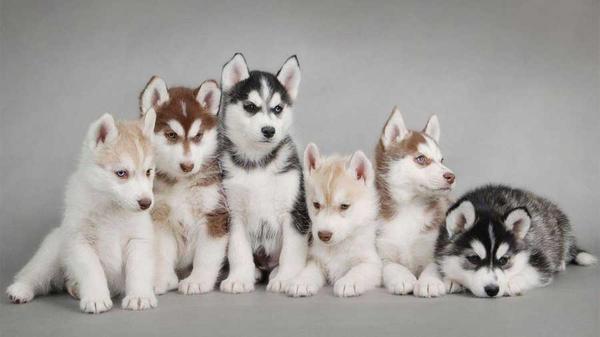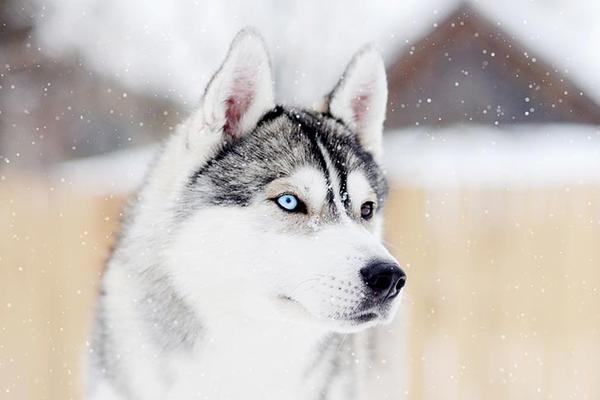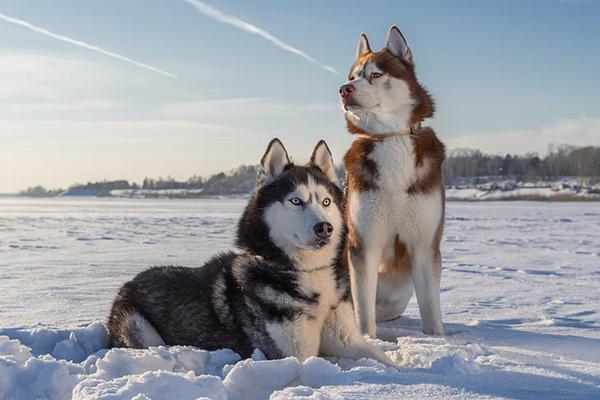Siberian Husky
also known as Chukcha, Husky, Sibe, Icee, Chuksha

 History
History
The Siberian Husky, is a medium-sized breed of dog that is believed to have originated in the northeastern region of Siberia, in Russia. The breed has a long and storied history that is intertwined with the history of the Chukchi people, the indigenous people of Siberia.
The origins of the Siberian Husky can be traced back to the ancient times of the Chukchi people, where it was used as a sled dog for transportation and hunting. The breed was developed to be able to withstand the harsh and freezing climates of Siberia, with its thick and warm coat, and also to be able to pull heavy loads over long distances.
The breed's name, "Siberian Husky," reflects the breed's origins in Siberia, Russia. The breed is also known as the "Chukotka sled dog" or simply "Chukcha" which is a reference to the indigenous people of Siberia, who developed and used the breed for centuries.
The Siberian Husky was a popular breed in Siberia and other parts of Russia during the 19th century, and it was often used for transportation and hunting. The breed was brought to Alaska by gold miners during the gold rush of the late 19th century, where it was used for sledding and racing.
The breed was recognized by the American Kennel Club (AKC) in 1930 and by the United Kennel Club (UKC) in 1938.
Breed Information
Is Siberian Husky a purebred?
Purebred
What were Siberian Huskys originally used for?
Sled Pulling
How Long Do Siberian Huskys Live? What is average life expectancy for a Siberian Husky? How long can Siberian Huskys live?
12-14 years
The average Siberian Husky lifespan is somewhere between 12-14 years, provided they aren't beset by any exceptional health issues or injuries.
Siberian Husky Height & Weight
How big is a full grown Siberian Husky?

| Height | ||||
|---|---|---|---|---|
| Average | 6 months | 12 months | 18 months | |
| Male | 21-24 inches (53.3 - 61 cm) | 16.5 inches (41.9 cm) | 20.0 inches (50.8 cm) | 22.5 inches (57.2 cm) |
| Female | 20-23 inches (50.8 - 58.4 cm) | 16.5 inches (41.9 cm) | 19.5 inches (49.5 cm) | 21.5 inches (54.6 cm) |
| Weight | ||||
|---|---|---|---|---|
| Average | 6 months | 12 months | 18 months | |
| Male | 44-60 pounds (20 - 27 kg) | 26.0 pounds (12 kg) | 45.0 pounds (20 kg) | 52.0 pounds (24 kg) |
| Female | 35-51 pounds (16 - 23 kg) | 21.5 pounds (10 kg) | 38.0 pounds (17 kg) | 42.5 pounds (19 kg) |
Do Siberian Huskys get fat easily?
![]()
![]()
![]()
![]()
![]()
The Siberian Husky is a dog breed that has a low to average risk for obesity. This means that they are less likely to gain weight than some breeds, but it is still important to monitor their food intake and ensure they get enough exercise to maintain a healthy weight and overall well-being.
Are Siberian Huskys Hypoallergenic?
No
Unfortunately, the Siberian Husky is not hypoallergenic, making it not a good choice for a dog lover who suffers from pet allergies.
What is a Siberian Husky personality? What are Siberian Husky dogs best known for?
Alert
Gentle
Outgoing
Friendly
Intelligent
Are Siberian Huskys heavy shedders? How Much Does a Siberian Husky Shed?
![]()
![]()
![]()
![]()
![]()
Siberian Husky dogs are heavy shedders, they will lose a significant amount of hair each year. To decrease the amount of shedding, you can regularly brush your Siberian Husky. This will remove loose hair and keep his coat growing in the same direction.
What is the watchdog ability of a Siberian Husky dog?
![]()
![]()
![]()
![]()
![]()
The Siberian Husky breed is one of the worst choice if you want a good watchdog.
Breed History
Where do Siberian Huskys come from?
Siberia
What are Siberian Huskys descended from?
Spitz-type Dogs
What organizations or kennel clubs recognize/register the Siberian Husky breed?
American Canine Registry
American Kennel Club
America's Pet Registry
Canadian Kennel Club
Dog Registry of America Inc.
Federation Cynologique Internationale
Kennel Club of Great Britain
North American Purebred Registry, Inc.
American Canine Association, Inc.
Australian National Kennel Council
Continental Kennel Club
National Kennel Club
New Zealand Kennel Club
United Kennel Club
When were Siberian Huskys first bred? How old is the Siberian Husky breed?
Ancient Times
What Breed Group is a Siberian Husky?
Working (AKC:1930)
Northern Breeds (UKC)

Siberian Husky Appearance
What color are Siberian Husky eyes?
Blue
Hazel
Brown
What color can Siberian Husky nose be naturally?
Black
Brown
What color can Siberian Husky coat be naturally?
White
Sable
Pied
Silver
Red
Brown
Gray
Black
How long is a Siberian Huskys coat?
![]()
![]()
![]()
![]()
![]()
The coat of a Siberian Husky falls in the medium length category.
How Dense Is The Siberian Husky Coat?
![]()
![]()
![]()
![]()
![]()
What is the texture of the hair of a Siberian Husky?
Straight
How many puppies can a Siberian Husky have in a litter? How many puppies can a Siberian Husky have in her first litter?
12-14 puppies per pregnancy
A Siberian Husky can have a litter of 12-14 puppies on average. However, it's worth noting that the size of the litters can vary greatly. Factors that can influence litter size include the health of the mother, breeding history, and genetics.
![]()
![]()
![]()
![]()
![]()
Siberian Huskys are known for their adaptability and versatility, they are capable of adapting well to a wide range of lifestyle changes and living environments. They are a highly adaptable breed, and make great companions for families and individuals of all lifestyles.

Siberian Husky Health Issues
Do Siberian Huskys have a lot of health problems?
![]()
![]()
![]()
![]()
![]()
The Siberian Husky is generally considered to be healthy. However, like all breeds, they are susceptible to certain health issues and it is important to keep an eye out for them and address them with your veterinarian as needed.
What are the major health concerns to be aware of when owning a Siberian Husky?
Epilepsy
Hemophilia
Laryngeal Paralysis
What are the less significant issues to keep in mind when it comes to Siberian Huskys?
Hip Dysplasia
Eye Problems
Zinc Responsive Dermatosis
What are the occasional tests recommended for Siberian Husky breed?
Eye
Hip
Skin Scraping
X-Rays
Eye Examination
Throat

Siberian Husky Needs and Activities
Do Siberian Huskys have a lot of energy?
![]()
![]()
![]()
![]()
![]()
Siberian Huskys are high-energy dogs, thus an active lifestyle suits them well.
Do Siberian Huskys need socialization? How social are Siberian Huskys?
![]()
![]()
![]()
![]()
![]()
Siberian Huskys have average social needs compared to other breeds. They are known to be less active and independent than other breeds, and they are content with spending time alone and with their human family.
How much exercise should Siberian Huskys get?
![]()
![]()
![]()
![]()
![]()
The Siberian Husky dog needs significant physical activity to maintain a healthy lifestyle. They are also well-suited for those who lead an active lifestyle and enjoy activities such as running, hiking, or other outdoor pursuits.
How much sleep should a Siberian Husky have? Do Siberian Huskys sleep a lot?
![]()
![]()
![]()
![]()
![]()
Siberian Huskys are active dogs that don't require as much sleep as other breeds. However, they still need enough sleep to stay healthy.
Does a Siberian Husky drool a lot?
![]()
![]()
![]()
![]()
![]()
The Siberian Husky is known to be an average drooler among dog breeds. Drooling is the unintentional flow of saliva outside of the mouth and can be a normal characteristic of certain breeds or it can be a sign of a health problem. In the case of the Siberian Husky, it is a normal part of their physiology, however it is important to keep an eye on the amount of drooling and any changes in drooling patterns, as excessive drooling can be an indication of an underlying health issue and should be checked by a veterinarian.
How much does it bark?
![]()
![]()
![]()
![]()
![]()
Siberian Huskys tend to bark moderately, they bark when necessary, such as to alert their owner or to communicate something. They may also bark due to certain triggers like fear, alarm, boredom, greeting, separation anxiety and compulsive barking.
Do Siberian Huskys exhibit aggressive behavior to safeguard their home and territory? Do they possess a natural tendency to guard?
![]()
![]()
![]()
![]()
![]()
Siberian Husky dogs are not known for their protective nature and may not be the best choice as guard dogs. They do not have a strong drive to defend their territory and may not be inclined to provide protection.
Are Siberian Huskys mouthy?
![]()
![]()
![]()
![]()
![]()
What is the likelihood of a Siberian Husky running away? Do they have a tendency to explore or wander frequently?
![]()
![]()
![]()
![]()
![]()
Do Siberian Husky dogs have a high prey drive?
![]()
![]()
![]()
![]()
![]()
What do Siberian Huskys enjoy doing? How do I keep my Siberian Husky busy?
Take pictures, Groom, Go to Park, Walk, Play, Chasing leaves, Fetch, Play keep away, Pulling, Exploring, Toys, Walking, Running, Sniffing, Play fighting, Hike, Run, Pooping, Peeing, Jump, Kisses, Chasing birds, Chase, Tons of running, More running, Tug-of-war, Playing, Brushing, Snow, Sniff
What is the energy level of a Siberian Husky? How much energy does a Siberian Husky have?
High
Siberian Huskys are high-energy dogs. They need mental as well as physical exercise. These dogs require a lot of your involvement and without it they can, and will, become problematic dogs.
![]()
![]()
![]()
![]()
![]()
How far should a Siberian Husky walk each week? How many miles should a Siberian Husky walk every week?
14 miles / week
There's really no limit to how far you walk your dog as long as they're comfortable. For Siberian Husky, it's at least 14 miles / week. Just remember to build distance and stamina gradually over time.
How much a Siberian Husky should exercise a day? How much activity does a Siberian Husky need?
90 minutes
In general most Siberian Huskys usually need at least 90 minutes of exercise daily. This can be spread across the day and include all sorts of high-energy activities, like walking, running and playing.
What level of grooming should be provided for a Siberian Husky?
![]()
![]()
![]()
![]()
![]()
The Siberian Husky is a breed of dog that requires an average amount of grooming effort.
How often should you brush a Siberian Husky?
Weekly
Siberian Husky should be brushed at least once a week. Of course you can give them more frequent brushes if you find that they are still shedding a lot
What are the most commonly used brushing tools for Siberian Huskys?
Slicker Brush
Comb
Deshedder
Nail Clipper
Costs
How many cups of food does a Siberian Husky eat?
3 cups
For an average 44-60 pound (20 - 27 kg) Siberian Husky feed 3 cups daily. But, keep in mind, the amount you feed is going to be dependent on the quality of the food you are feeding.
How Much Does a Siberian Husky Cost Daily?
$1.70 - $2.00 / day
The average cost of a Siberian Husky is somewhere $1.70 - $2.00 per day.
How Much Does a Siberian Husky Cost Per Month?
$48 - $63 / month
The average per month expenses of a Siberian Husky is between $48 - $63. This makes an average of $576 - $756 per year. It will be on the higher side when the dog is still small because it will need more frequent visits to the vet, shots.
Siberian Husky Characteristic
How intelligent is a Siberian Husky?
![]()
![]()
![]()
![]()
![]()
Siberian Huskys has average obedience intelligence. But, they're also independent thinkers. The Siberian Husky is a breed with an exceptionally high IQ and may get into mischief if left to their own devices.
How sensitive is a Siberian Husky dog?
![]()
![]()
![]()
![]()
![]()
This dog breed is more sensitive than others and easily overwhelmed by new surroundings and people. They need gentle handling and a calm, stable home environment with positive reinforcement training.
Are Siberian Husky dogs affectionate?
![]()
![]()
![]()
![]()
![]()
Do Siberian Husky do well in apartments? Are Siberian Huskys good indoor dogs?
![]()
![]()
![]()
![]()
![]()
It's not recommended to keep the Siberian Husky in an apartment, but this breed make good apartment dogs as long as they get to spend a good amount of time outside of the apartment. Siberian Huskys living in apartments will need plenty of physical exercise and stimulation throughout the day to remain happy and well-behaved.
Are Siberian Huskys good with kids? Are Siberian Huskys good around children?
![]()
![]()
![]()
![]()
![]()
Siberian Huskys are kid-friendly dogs. They are good with children and excellent dogs with children if they are socialized and trained at a young age.
Are Siberian Huskys good for elderly?
![]()
![]()
![]()
![]()
![]()
Are Siberian Huskys good with cats? How friendly Siberian Huskys are toward cats?
![]()
![]()
![]()
![]()
![]()
Siberian Huskys are not cat friendly dogs.
Do Siberian Husky dogs get along with other dogs? Are Siberian Huskys OK with other dogs?
![]()
![]()
![]()
![]()
![]()
Siberian Huskys are very friendly towards other dogs. This breed typically have a happy and affectionate temperament around dogs.
How do Siberian Husky dogs interact with other pets? Are they considered pet-friendly?
![]()
![]()
![]()
![]()
![]()
Are Siberian Huskys friendly with strangers?
![]()
![]()
![]()
![]()
![]()
Siberian Huskys are average friendly around strangers. They can be wary around strangers and a little standoffish. Early socialisation is key.
Do Siberian Huskys like to play? Are Siberian Huskys playful?
![]()
![]()
![]()
![]()
![]()
The Siberian Husky is a playful dog. So, no matter how busy the day may get, the best thing you can do for your Siberian Husky is to make time each day to play. It can be as little as 15-20 minutes, and it will mean the world to them.
Are Siberian Husky easily trained?
![]()
![]()
![]()
![]()
![]()
Siberian Husky dogs can be hard to train, they may not understand the association between commands and actions. To have them obey, consistent and patient training is required.
 Pros & Cons
Pros & Cons
Pros
- Lack of odor
The Siberian Husky's chances of having an unpleasant odor is low. - Playful
They are playful and energetic. - Independent
They are independent and do not require constant attention. - Maintain a healthy weight
Siberian Huskys tend to have a low to average risk of overweight.
Cons
- Not Hypoallergenic
Siberian Huskys may not be the best choice for those with allergies, as they may cause allergic reactions. - Not cat-friendly
Siberian Huskys are not recommended for households with cats. - Not Apartment Friendly
Siberian Husky breeds may not do well in a domestic setting. - Not suitable for office environment
Keeping a Siberian Husky in an office may not be ideal - Grooming
They have high maintenance grooming requirements due to their thick double coat. - Escape
They have a strong tendency to wander or escape if not properly secured.
Compare Siberian Husky with other dogs
- Siberian Husky vs Deutsch Drahthaar
- Siberian Husky vs Mini Yorkshire Aussie
- Siberian Husky vs Tibepillon Terrier
- Siberian Husky vs Treeing Walker Coonhound
- Siberian Husky vs Sheltie Tzu
- Siberian Husky vs Eng-A-Poo
- Siberian Husky vs Havallon
- Siberian Husky vs Kerrblushcnauz
- Siberian Husky vs Beabull
- Siberian Husky vs Weeranian